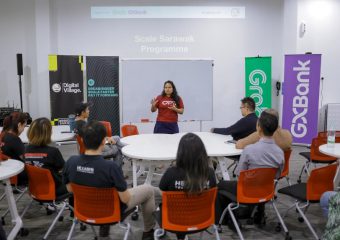We have previously pointed out how young Sarawakians need to have knowledge and skills in technology and entrepreneurship; build a team of diverse, supportive individuals; and develop products or services that meet their target market to become successful technopreneurs.
For technopreneurs to flourish in their home state can be challenging, as Sarawak is only in its initial stage of developing its digital economy.
Nevertheless, through the E-Commerce Transformation Plan (E-Com Y30), the state government intends to establish an innovative and creative ecosystem that nurtures technopreneurship among Sarawakians.
In line with this, Azam Sarawak and the US Embassy Kuala Lumpur organised a talk and panel discussion on technopreneurship, focusing on establishing a technological and entrepreneurial ecosystem using Silicon Valley as an example.
Throughout the comprehensive and fruitful session, participants including young entrepreneurs, relevant industry players, and government agencies had the opportunity to hear from and consult with local and international industry experts on the latest developments in technopreneurship and potential applications in achieving Sarawak’s digital economy goals.
Here are a few relevant points for young Sarawakians that we noted during the session:
Sharing economy
The concept of mutual consumption of assets or services between individuals for free (or not) is due to the democratisation of participation among consumers resulting from the greater accessibility technology has provided.
The success of companies such as Uber and Airbnb illustrates how the sharing economy challenges traditional business models by focusing on networks and connections instead of capital and production with its asset-light economic system.
This gives entrepreneurs the opportunity to explore untapped markets with scarce assets, especially where the latest technology can help solve long-standing problems affected by communities.
Taking initiative
Young Sarawakians can take advantage of existing enablers in their entrepreneurial endeavours, from creative incentives and financial schemes by federal and state governments, to entrepreneur development initiatives from the likes of Malaysian Global Innovation and Creativity Centre (MaGIC), and Borneo 744.
Still, technopreneurs are encouraged to discover, learn and use current platforms available independently such as cloud services, which have shown its capability in the building and marketing of start-ups.
Changing mindset
Through various efforts, Malaysia is targeting for 5 per cent of local graduates to become entrepreneurs by 2020; but only 2.5 per cent started their own businesses last year.
This suggests that graduates have yet to embrace entrepreneurship, whether because they fear risk-taking or their parents discourage them from having an ‘unstable’ career.
However, despite the risks and hardships involved, studies have shown that entrepreneurs can stimulate a country’s economy by providing new products and services, job opportunities and technology, among many other contributions.
Learning from failure
Most importantly, no business becomes successful without failure, and budding technopreneurs need to learn from stories on business failures while establishing their own start-ups.
Even if they themselves fail, technopreneurs must reflect on their mistakes, revise their business plans, and remain steadfast in their efforts while focusing on their essential aim as entrepreneurs: solving a problem that will benefit people in the long run.
This is a weekly column by SarawakYES! – an initiative driven by Faradale Media-M Sdn Bhd and supported by Angkatan Zaman Mansang (AZAM) Sarawak – to provide advice and stories on the topics of education and careers to support Sarawakians seeking to achieve their dreams. Join us on Facebook, Twitter, Instagram and YouTube.
This article first appeared on The Borneo Post, visit this link: http://bit.ly/2wcwbB1




